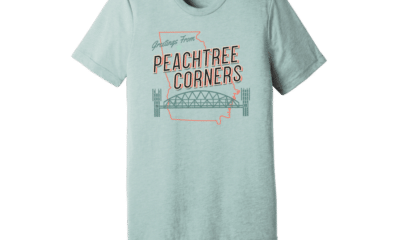Community
“Stay Positive” Debbie Mason’s Journey with a Daunting Diagnosis (podcast)
Published
4 years agoon
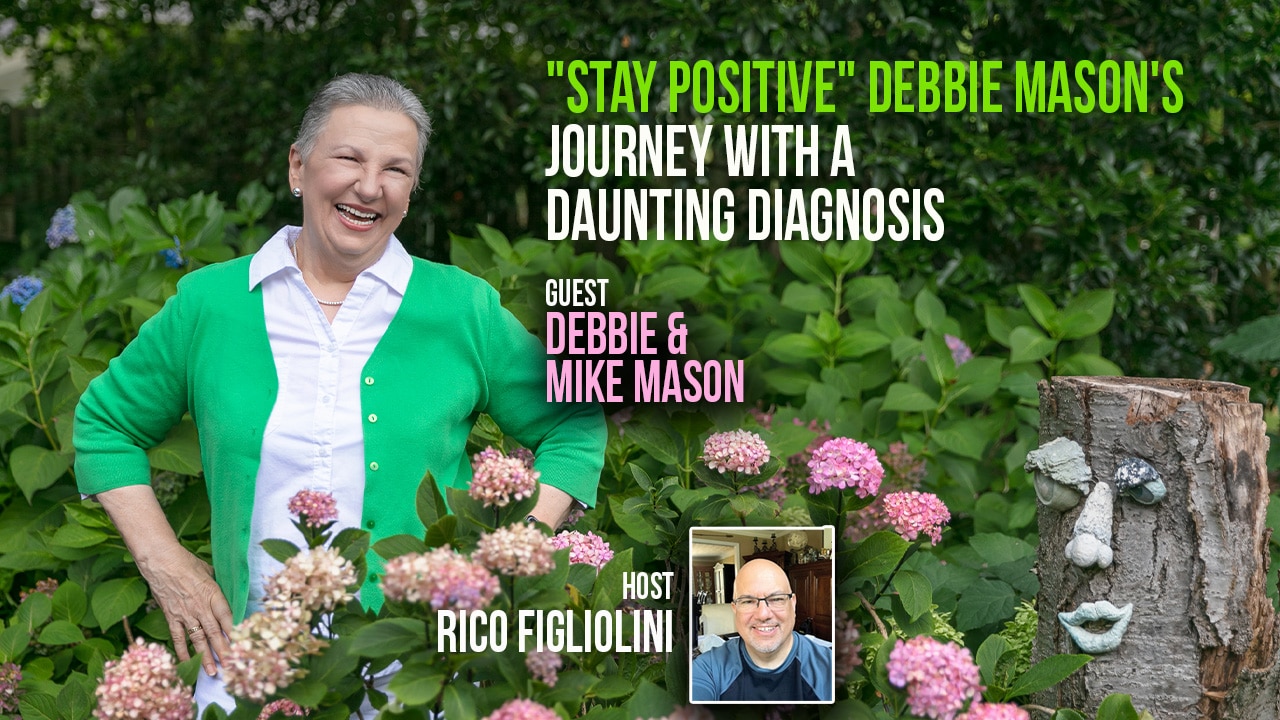
Cancer is never a diagnosis you want to hear. Debbie Mason, active resident of Peachtree Corners and wife of Mayor Mike Mason has faced ups and downs in her battle with this terrifying diagnosis. In this follow-up episode to the article in Peachtree Corners Magazine, Debbie and Mike share the story of their incredible journey.
Time stamp:
[00:00:30] – Opening
[00:02:05] – Routine Testing
[00:05:21] – The Diagnosis
[00:07:51] – Treatment and Complications
[00:16:01] – Love, Support and Prayers
[00:18:07] – Changing Priorities
[00:20:57] – Mike’s Feelings
[00:24:33] – Dealing with COVID
[00:25:53] – Next Steps
[00:30:10] – Closing
“I’ve clearly felt the love… I’ve been told that I have a whole city of people praying for me. And I felt that prayer, I actually can feel it. So it humbles you. Because usually I’m on the other end of the giving, in all my years of doing all that I do. I’m usually the one doing for people.”
Debbie mason
Podcast Transcript
Rico: [00:00:30] Hi everyone. This is Rico Figliolini host of Peachtree Corners Life, the podcast that talks about everything that’s happening in the city of Peachtree Corners. And shares the stories that are out there of people that are working in this community, playing in this community, living here. Sometimes we also do podcasts as follow up to articles in our magazine, Peachtree Corners magazine Tonight is one such podcast. We have a story in this latest issue about a young woman. I’ll call her a young woman because young at heart, right? She’s with us, her and her husband. They’re going to share a story and a journey that I think is important for everyone to know because of how it came about and because of what she’s going through. It’s interesting in a time of social distancing though, in a way of life that we’ve all become accustomed to, right? Because of the pandemic, because we’re afraid of catching Coronavirus 19. But washing our hands we’re doing social distancing, we’re facing these challenges and yet among our lives among other people, there are other challenges that within the midst of that, other challenges are coming up that they have to face. Complicated in this world, but it is such that the world doesn’t stop, it just keeps going and things will happen as they do. But good story here and a good message that you should all take from this. So let me introduce Debbie Mason and Mike Mason. They are with me tonight to talk essentially about the journey that started in November, 2020 or November, October. So Debbie, why don’t you bring us through a little bit about what is going on, how all this started and tell us about it?
Debbie: [00:02:05] Well, It was very, a very innocent happening. Mike and I were helping a local political candidate run for reelection. And we were working in her campaign and I simply called and asked a neighbor if we could put a sign in his yard. And he said, oh, sure. Put a sign in our yard, we love that person. But don’t hang up, Debbie. I want to talk to you about something else. And I said, what is it? He went on to say did you know that my mother recently passed from ovarian cancer? I said, oh, I’m sorry. No, I didn’t know that. And he said on her death bed, I made a promise to her and she made me promise every woman I talk to, I would tell her to get a CA 125 test. Now that’s just a blood test. I said, I’ve never heard of that test. And it was Richard Munos a nearby neighbor. And I said tell me about it. He said it’s just a blood test. I mean, you can get it any time and costs maybe $25, $50. But you can add it in with your blood work when you’re having a physical and I was due for one. And so I went in several months later and I asked the doctor to add a CA 125 test to that. And when I got the results back, it was slightly elevated. It concerned me. I’m a little scared, but the doctor said, don’t worry about it. That test can be high for a number of reasons. But if you’re really worried, we can get a scan. And since you’re, an older woman that would probably be wise. So we took the next step and I had a scan of my abdomen. And they found what they called a thickening in my uterine wall. And he said I’m not really worried about that. It’s out of my hands now. You need to go to your gynecologist and have him check it out. So I went to my gynecologist, had him check it out. And he said, Debbie, I don’t think that is a thickening I believe it’s a polyp. I said, do I have anything to worry about? And he said no. We see these all the time, it’s just a polyp, we’ll do a DNC where they scrape the inside of the uterus and get rid of it. But we’ll go ahead and take your fallopian tubes and ovaries because you’re past childbearing age and then you won’t have to worry with the CA 125 test anymore. I said that sounds good. So we scheduled it. It was scheduled very soon, right before Thanksgiving of 2020. Several days later I recovered nicely We were about to go out to dinner actually to celebrate my good health, when the phone rang and it was Dr. Morgelle. And he said, Debbie, I’m sorry to have to tell you. I have devastating news. The polyp was cancer.
Rico: [00:05:17] What did you think about at that moment?
Debbie: [00:05:21] I couldn’t breathe. It’s just, when I think about it. Nobody wants to hear that. And then he went on, it got worse. He said it’s carcinosarcoma. Well, I’d never heard of that. And he said, it’s the worst diagnosis any woman wants to hear. He told me the kind of cancer it was. And we talked shortly and then we hung up. And so needless to say, we called my sons and canceled dinner. They came over, we cried. But you know, like we always do Rico, in anything that we tackle, what’s the next step? Well we were going in, it was the week before Thanksgiving. We said, okay, now who do we know? What can we do? Our minds started turning. And Mike might want to come in here cause right.
Mike: [00:06:20] You always go with the facts. And so I immediately, after supporting Debbie and everything, got through that, I said, look. Before we get too far into this, let’s get the facts. because she was told you need to get a surgeon immediately. A gynecologist who’s also a surgeon and I recommend this person. It’ll be hard to get that guy because he’s on Thanksgiving holidays. And so we started calling people to how quickly can we get in to see him? How quickly can Debbie have the surgery? But in the meantime, you go to Google and you figure out everything you need to know about carcinosarcoma. And it’s terrible. It’s exactly what the doctor said.
Debbie: [00:07:02] Everything that you hear is gloom and doom, because this cancer is always found late stage.
Mike: [00:07:11] Late third or fourth. You don’t see symptoms until late.
Debbie: [00:07:15] Yeah.
Rico: [00:07:16] When we had that conversation some weeks ago, you and I. And I thought this would be great to share in the magazine and on the podcast I went and I looked. The same thing you did probably, Web MD and you look at all the stuff that’s out there. What type of cancer is it? And you’re right, it’s scary. And even if you’re not a religious person, I think you find that the world sometimes brings things to you, presents themselves to you in a way. Opportunities present themselves to you. You walked up to that guy’s door and you found salvation to a degree, because you found it early.
Debbie: [00:07:50] Yeah.
Rico: [00:07:51] So once you went through that, once you got tests, the shock I’m sure, and the emotion and the supporting. I think husbands to some degree, want to be problem solvers. We want to be able to be that supporter, but we want to solve the problem. So how did it go? Where did you take it from there then? Because it was before Thanksgiving. So how did that go?
Debbie: [00:08:11] First of all, we called our family doctor. Who had found it through a scan, the polyp. Because the doctor we had contacted, the surgeon who we weren’t able to get in to see until after Thanksgiving said to have a chest x-ray or a scan of the chest. I said to Dr. Singal and we had occasion to talk to him can you order that? And he said, yes we’ll get that right away. Went over and got that done. But I think we mentioned to Dr. Singal in him getting the results saying that, because this cancer would typically move to, the lungs is a popular place it likes to go. That scan did not show any evidence of metastasis as we read the results. And we asked Dr. Singal. So well, we just had the other scan, he said that should help too. And between those two things, for the first time, I felt a little bit better. Mike, is on the board of health with being the mayor of the largest city. So he’s friends with Audrey Arona who is the chairman of the board of health and she just so happens to be a gynecologist before she was on the board of health. So again, we’re grasping for information and we can’t find professionals fast enough. So we called her and ran that past her. And we told her the story. She said, what? You mean, how? You found this?
Mike: [00:09:50] She said, you weren’t having any symptoms?
Debbie: [00:09:52] This cancer is always found because a woman is bleeding and that’s usually stage three or stage four. Debbie, this neighbor of yours probably saved your life. Well we, that it is yet to be seen but she’s right. Because I was thinking let’s get my affairs in order Mike. I mean, I’m going to die. Well, we all know we’re going to die, but I wanted to think I would have it a little more time on this earth. But I thought I would have to get my affairs in order. She said, Debbie, this is survivable. And that was the second ray of hope that I got. When we finally got in to see the surgeon, he was more gloom and doom. Because he says that cancer is just a monster. It’s known for coming back. Let’s just get it out as quickly as we can. So we got it out a few days before Christmas, it took me almost a month to get it scheduled. People love to do surgeries at the end of the year for insurance purposes, I understand. So we said, whatever hospital, I don’t care where we have to go, first available. And they took out my entire uterus because he had to determine if it had passed through the wall. And that’s how we were able to stage the cancer. And then he called me, but of course he told me the good news in the hospital. I had a little setback, but was home recovering well. And I started bleeding and it just wouldn’t stop. So they rushed me to the hospital. And I have a heart issue as well, and I was taking a blood thinner. And that was complicating the situation. So they got the bleeding to stop and everything was fine. But I remember him coming into my room. He said, Debbie, stage one. You’re lucky. Stage one. And he held up his finger like that. And I said, oh my God, I cried and cried. But he said I’m gonna still present your case to the tumor board at the hospital. And they’ll tell us what they want you to do. So he did, he presented it and they suggested since the cancer had progressed through 60% of the wall of the uterus. They don’t like to see more than 50%. 50% they’ll only recommend radiation. Since it was a little more, he said for the best outcome for this woman, let’s do chemo and radiation. And I thought if that’s what we got to do, let’s do it. So I scheduled a chemo for the next week, went in, did a full round of chemo. And went a week later for my blood work. And they looked at me, I was awfully tired but I assumed that was from the chemo. They looked at me and said, my goodness when did this start? And I said, when did what start? What do you mean? They said, well you’re terribly jaundiced Debbie. And so the doctor came in and said, oh my goodness. Let’s put her in a wheelchair and take her downstairs to the hospital. We were over at Duluth North Side. And I had gone into a rare reaction to the chemo. 1% of the population experiences this, and I was in liver shutdown. And so the doctor pulled the chair into my room and I said, this doesn’t look good if you’re going to come in and sit down. Because you know, doctors just don’t usually do that. And he said, yes, it is. You can live with cancer, but you can’t live without a liver. And they even talked to liver specialists at Emory about the possibility of a transplant. But then the guy we contacted Dr. Lord who is wonderful, came into my room and said, who said anything to you about liver failure? You’re not in liver failure. The liver is a wonderful organ that bounces back. What I suspect will happen, I don’t know for sure, but what I suspect will happen, your liver values will rise. It’ll take a day or two for us to see. So the next day they came up slightly and the day after that, they came up even more. And so they let me go home because there’s nothing that you can do to improve your liver. It just does, it just reacts on its own. It took about a month for my liver values to get back to normal. So I survived that, I dodged that bullet
Rico: [00:14:55] They ended up stopping the chemo?
Debbie: [00:14:58] Yes. They said, no more chemo for you. It’s like Jerry Seinfeld with the soup Nazi. No more chemo for you. So the only thing I can battle this cancer with is radiation. Once I recovered enough, I started on my journey with radiation. And I had three rounds of high dose radiation. Which I can’t say I really suffered any side effects from that. A little bit of tiredness. But I was lucky. I thought I was due, I was overdue for some luck, so.
Rico: [00:15:36] That’s right. Most people have, depending on where the radiation is done, most people end up with side effects and stuff. But you obviously were able to bounce back and going through that radiation, the three rounds of radiation. When was the last round that you had?
Debbie: [00:15:52] It was probably the end of February.
Mike: [00:15:55] I was going to say, sometime in March, but same time frame.
Debbie: [00:15:59] It may have been the first week of march.
Rico: [00:16:01] Right. So Debbie, you’ve gone through a lot. Back and forth, complications, liver. I probably not knowing how it would exactly feel, I certainly know how bad luck feels sometimes I feel you know, darn, I don’t win the lottery and I’m doing this what’s going on? You know, and you’re fortunate you have a lot of people you know. So for those people that obviously, I think people know Mike Mason’s the mayor. I think most people know you’re the first lady that you’ve been you’re a founder and on the board of the Peachtree Corners Festival. You were part of the United Peachtree Corners Civic Association, you’re still on the board now. I’ve known you guys going back. I don’t know, 20 odd years, maybe? I don’t know, It’s been a long time.
Debbie: [00:16:45] It’s been 20, 25 years.
Mike: [00:16:46] When you first moved here.
Rico: [00:16:48] That’s right I moved here in 95, met Tom Rice actually, knocking on my door, the first campaign. And I was like, do I know you? And he was like, I’m Tom Rice, I’m running for office. A former assemblyman for those that don’t know. But yeah, it’s been a long time now. And I don’t know your personal lives per se. But you know, I’ve seen your kids grow up a little bit and stuff. But you’ve had a whole city, lots of friends I think. You must have a tremendous amount of support from people that you knew.
Debbie: [00:17:15] I’ve clearly felt the love. My youngest son who doesn’t live here, came all the way down from Connecticut and he came in right before Christmas and he stayed through surgery. And he didn’t stay through the radiation, but he stayed there through most of the tough parts. And just countless people with food, with sending gift cards. And the stack of cards I got and all the people saying I’m praying for you. And I’ve been told that I have a whole city of people praying for me. And I felt that prayer, I actually can feel it. So it humbles you because usually I’m on the other end of the giving in all my years of doing all that I do. I’m usually the one doing for people.
Rico: [00:18:07] You’ve been a fundraiser, you’ve been out there for a lot of different charities working on foundations. You’ve worked on the Norcross High School Foundation of Excellence. Actually, you guys were I think entered into the hall of fame. You’ve been out there doing things. And so when something like this happens and you’re on the other end of that receiving. And obviously the big C word that people worry about, thank God, you seem to be heading in the right direction. Do priorities change? What has been probably the biggest change in your life?
Debbie: [00:18:37] Well, you look at life differently, I’ll say that. You don’t think long-term, you think short term. Mike and I, always say we give ourselves away. It’s something that we need to do for the community. But we might forego something that we wanted to do. I don’t do that anymore. And I, told my partner in crime for the festival just the other day. I still love the festival it’s just my baby. I birthed it. But I just don’t feel the burn to raise the money like I used to, I used to treat it like it was buried treasure. There’s a dollar out there, I gotta find it. And I just don’t feel that anymore. And I’ve dropped off of, I used to be on Gwinnett, Clean and Beautiful board. And I’m still active in my neighborhood. But I’ve just slowed down. I take more time for me. I still make it a point that I attend every city council meeting and work session. I think probably since the city’s been in existence, I missed one meeting when I had heart surgery and I missed one meeting…
Mike: [00:19:52] Pesky cancer, right?
Debbie: [00:19:54] Yes.
Rico: [00:19:56] Right. I know you have a beautiful garden and we had a photographer go out and take pictures and I can tell you it was hard to pick out the right picture for that spread in the magazine. So there was a lot of great pictures in there. Do you find yourself spending more time there? What do you find yourself doing?
Debbie: [00:20:13] Our garden has never looked more beautiful because we got started early this year.
Mike: [00:20:18] She did a great job.
Debbie: [00:20:19] But because of COVID-19. COVID has been good to us because we’ve sidestepped the disease and it’s given us more time at home to plant. Because when I’m in that backyard, I’m in the zone. My hands are in the dirt and everything. Mike says, I paint with flowers.
Mike: [00:20:38] She does.
Debbie: [00:20:40] Yes, you’re right. I had changed my priorities there. We just love our yard. We enjoyed a staycation before it was popular to staycation. Because we’re not big travelers. We’re homebodies and we just love our home and we love our backyard.
Rico: [00:20:57] Mike, as a husband, as mayor of the city as a friend. Husbands are sometimes deep friends with their wives, right? You hope that’s the case. How did that compare? How did you feel? Tell me a little bit about how that felt man to man here.
Mike: [00:21:11] You probably know this about me and a lot of people do. I’m very objectives oriented and I just make a list and work the list. I was an accountant, a chief financial officer for years and years. I try to get the irrefutable facts. And so that’s what I started doing. Jokingly I like to say, I wish the had the luxury of having feelings. But it’s helpful. If you try to avoid having feelings, you can’t. It’s your wife. Been married 48 years. It’s your best friend. But you also play the role. So one role is I’m the guy who’s got to get all the facts and make sure that when we talked to doctors, I’m there. And COVID got in the way and Debbie would zoom me in or FaceTime me in.
Debbie: [00:21:58] Yeah, he was not allowed in the room. When I saw these doctors and like I said, it’s like drinking out of a fire hose and the information is coming. And when I would leave the room. I couldn’t remember anything they told me. It was just overwhelming.
Mike: [00:22:14] And I would be able to communicate. Because I had already read everything that’s possible to read. And I’d already figured out stage one is this, and stage two, is that. But what about this? And so I was ready. And so we went through that and I would help her. I would provide structure to her. Okay, no. Here’s the parts. Here’s what we’re going to do. I’m talking to the doctor and this is it. I would call doctors and schedule things for her so that she didn’t have to deal with a lot of that stuff because you don’t have a lot of bandwidth left. You know, that was the thing. It was emotionally draining to deal with it. So she was dealing with something that would drain away. And if you’re dealing with the bureaucracy of a doctor’s office or a hospital, that can kind of drain you too. So I would handle all that. And then when we would get setback news, or it would be like, oh no, what does that mean? My job is always to be the team cheerleader. No, that is not what it’s going to happen. You know, you have to focus on this, you have to wait and get this fact. All we’ve heard is this, that does not mean that. And you have to be very clear on expectations and relentlessly shamelessly cheerlead.
Rico: [00:23:32] Even when I’m sure that Debbie would be like, I don’t need the cheerleading. This is the way I’m feeling right now. I’m just going to have to go with it. Because I can imagine. I have a wife that, I’m at the doctor’s with her sometimes like that, because it’s not only listening to the stuff. She’s very good about remembering everything. She remembers everything. But you want to be there to handle perspective also, right? It doesn’t mean this because you’re only listening from a certain point of view because that’s where you are. You’re afraid of what’s going on and it’s a tunnel vision almost. And you need that extra person there with you that you trust to be able to bring you back a little bit.
Mike: [00:24:08] Yeah. To literally ask questions about now, wait a minute. Let’s be clear. What about this? What about that? Because when you’re in the moment with a doctor they give you time. But remember, they’re trying to get to the next patient as well. So you want to get all the facts clarified before.
Debbie: [00:24:25] And when they’re a cancer doctor, guess what? The next patient has cancer too. They want to have their time and they should have their time.
Rico: [00:24:33] And COVID obviously ranked in there because of the way the hospitals were working then. At least the beginning of the year. Did that even bother you? Was that a concern?
Debbie: [00:24:43] I was scared to death. Let’s see, COVID started around February of 2020, I mean 19. And then I got the diagnosis of my cancer in October. And you had to mask up. No doctor’s office would let anybody else in the room. And the last place you ever wanted to be was in a hospital. And I was in the hospital for two surgeries. And then for two times for my liver failure and my bleeding episode. How we managed to, and still, I thank God that we had sidestepped getting COVID-19 so far. And I’m worried about this Delta variant. Oh my goodness.
Rico: [00:25:29] Right. So you guys masking up still now when you go out? If it’s too crowded?
Mike: [00:25:33] We started again.
Debbie: [00:25:34] It depends. When I go to the grocery store, if it seems especially crowded, we mask up. And in restaurants or our favorite restaurant that we go to. But for most places, this morning I was at the nail salon, we were the only two people in there, we didn’t. We just use our judgment.
Rico: [00:25:53] Yeah, no, I get it. And you’re right. I just thought of masking up a couple of days ago because of the variant and stuff. And I also found out one of my tennis partner, but he was on the altar team I’m on, has COVID. Just got it. Even though he’s fully vaccinated. So there you go. And there are more people like that it seems. I’ve been speaking to a few doctors and they’re seeing more of that. That even though you’re fully vaccinated, there’s still people catching it. So you want to be careful out there and you’ve adjusted your lifestyle a bit. You’ve set your priorities. I’m sure moving forward as things progress. God willing, everything stays better. I know you’re still concerned. You have another test coming up in a week or so.
Debbie: [00:26:31] Yeah. I mean when we got the word that the scan, the first scan that I received, there was no sign of metastasis. So it was clear. Naturally I cried in the office And they told us how it works. You won’t have another scan unless you have symptoms. So anyway, when we got the number of the CA 125 test and that number had elevated, I said, oh no, it’s probably just like Dr. Solmeri said it’s back. And then Mike in his cheerleading fashion said, no Debbie. Remember, let’s look at the facts. He reels me back in when I need it and thank God I’ve got him. I don’t know how I got so lucky. We’re gonna go next Wednesday to have that CA 125 test redone and see if it’s jumped again. So we’ll know then if it has jumped again, there will probably be something going on. But if it has stabilized because that number can go up or down, it’s not a finite number. Like most blood tests. It can bounce around. It measures inflammation. And so inflammation can be from whatever.
Rico: [00:27:48] Yeah. A variety of reasons. I’m sure.
Debbie: [00:27:50] Yeah.
Rico: [00:27:50] I think we’re at a good point here. I appreciate you sharing your time with us, with everyone, to talk about this. Obviously CA 125 is the test that every woman should take. And it’s like you said, it’s inexpensive. It can be part of your physical, your lab work.
Mike: [00:28:07] The CA obviously stands for cancer, but it measures inflammation as Debbie said. So there are a lot of false positives. Young women, particularly. If a woman starts her period, it’s going to skyrocket. But it can register all kinds of things. That’s why doctors say they don’t do it routinely with women over a certain age. But we have gone through this with other doctors.
Debbie: [00:28:28] I can remember the oncologist, the surgeon telling me, he said, I don’t want you going out and telling every woman you meet. Because he knew the story. To get a CA 125 test. It’s just gonna cost them money and it’s going to scare them to death. I said well, yeah, I was scared to death too. But what if they’re like me Dr. Solneri? And he said yes, in your case, it may have saved your life. And that’s the end of the story. Give me false positives. I’ll take them all day long. If I peel that onion and it comes back, no cancer.
Rico: [00:29:08] I think at one point mammography was like that. They were trying to say, let’s cut it out because you don’t need it at a certain point. Every life is important. Yes. You want to be able to have that option.
Mike: [00:29:19] Exactly.
Rico: [00:29:20] If you want that option, you should be able to have it.
Debbie: [00:29:22] I would like to think that every woman, by the time she maybe is age 40 would be a good time to start. I’m quite sure there’s women somewhere that have gotten this cancer younger than that. But I think to be reasonable at 40 would be a good age. But most certainly, I was a 70 year old woman. I still had my uterus, a lot of women don’t. I went for genetic testing to see if I had a marker somewhere that a BRACA gene was why I got my cancer and they were all negative. And the genetic lady told me, the reason you got cancer debbie was just because you had a uterus.
Mike: [00:30:08] She didn’t inherit it from anybody.
Rico: [00:30:10] Wow. Okay. I appreciate your time with us. I know we had talked before about how Debbie is from Indiana. Mike’s from Georgia, native. Just to give some people some background. Although when did you leave Indiana Debbie? Did you come straight to Georgia or did you come through by way of somewhere else?
Mike: [00:30:27] How long do you have?
Debbie: [00:30:30] That story is so long, Rico, I don’t know if you really want to know the answer.
Rico: [00:30:37] That’s for another podcast then.
Debbie: [00:30:39] Yes, another podcast
Rico: [00:30:42] It’s good to have you on and I appreciate you sharing your story. It’s a touching story. And Mike and Debbie.
Debbie: [00:30:47] I thank you for letting us have the time with you to share the story. Because if this saves one person’s life, it will be worth it.
Rico: [00:30:59] For sure.
Mike: [00:31:00] And I’ll take this opportunity. Constantly, relentlessly, get vaccinated. Same thing. Get a CA 125. I do it all the time with people. And I mean it. Some people get mad at me. I’m sorry. Not really. But be vaccinated. And women over a certain age, really talk to your doctor about it. But CA 125. Might save your life.
Rico: [00:31:23] Thank you guys. I appreciate that. Thank you. And thanks everyone for listening. Pick up the magazine, you’ll find it at most businesses and catch the show later.
Related
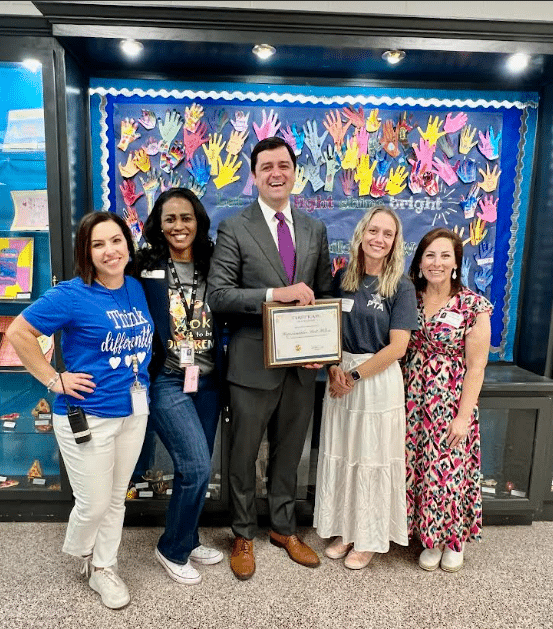
Simpson Elementary School celebrated Exceptional Children’s Week (ECW) last month with five days of special activities to recognize their special needs population and all of their exceptional students.
April 14–18 is set aside each year to celebrate children with disabilities, gifts and talents. This year’s ECW theme was Bridging Gaps and Building Futures, and the school was happy to take part.
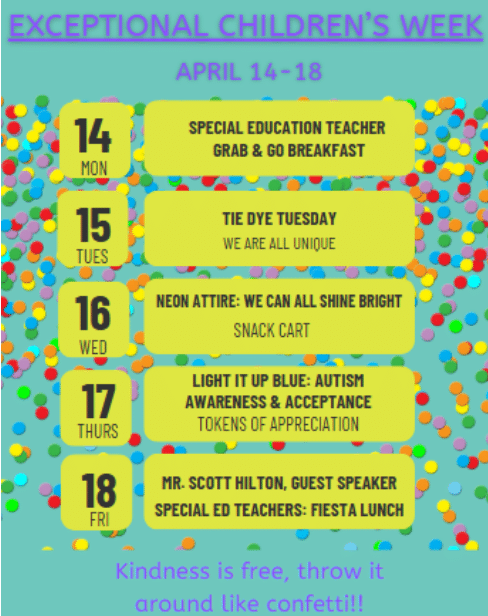
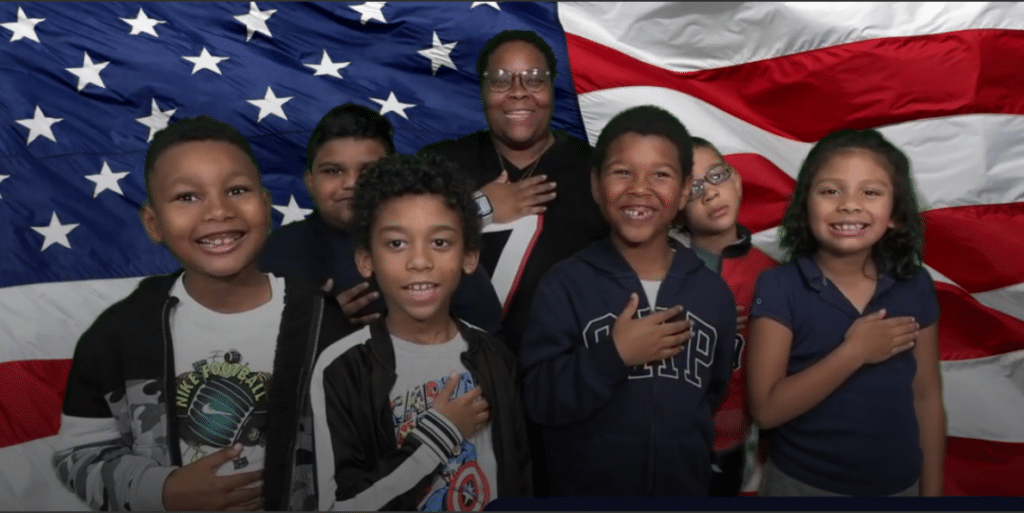
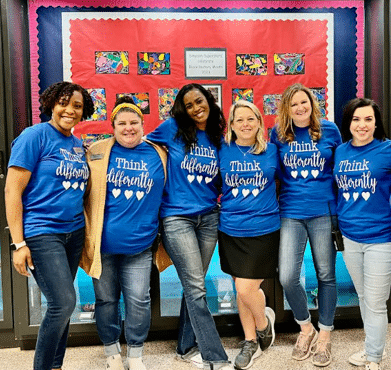
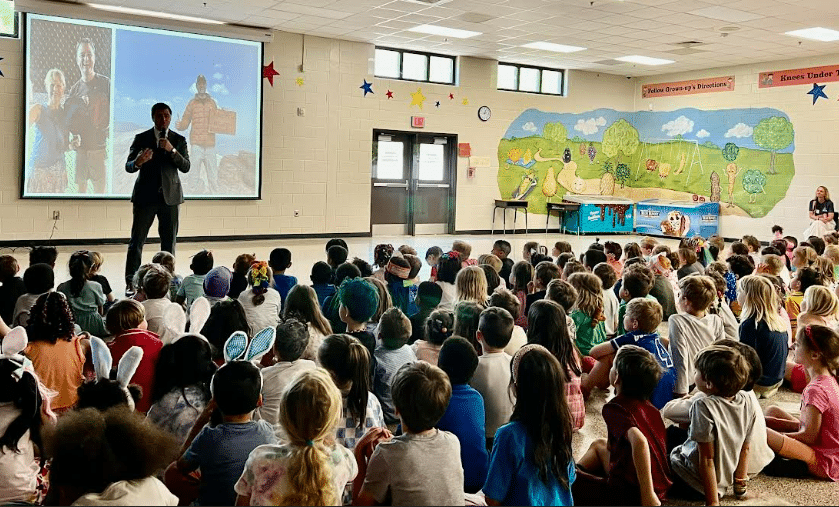
They highlighted each day of the week on the morning news with fun facts about notable people in society — and throughout history — who have overcome challenges with their disabilities, including actor Daniel Radcliffe (who has lived with dyspraxia for his entire life), Tom Cruise, Whoopi Goldberg, Frida Kahlo and Helen Keller.
Simpson Elementary’s technology team also pre-recorded various special needs classes reciting the Pledge of Allegiance every day of the week.
Guest speaker
To end their ECW with a bang, they invited former Simpson Elementary parent, State Representative Scott Hilton, to come in and speak to their K-2 classes about raising his son, Chase (who is autistic and now a student at Norcross High School), and how being different is okay.
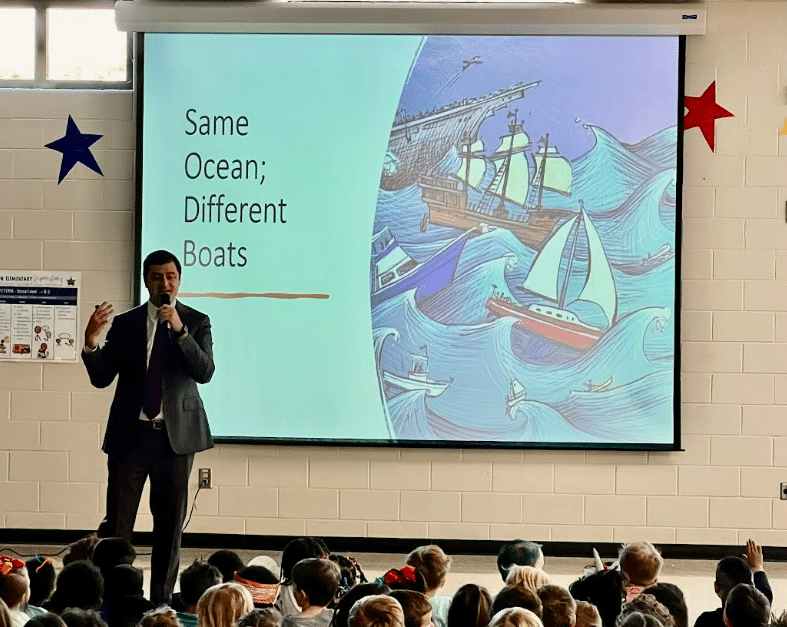
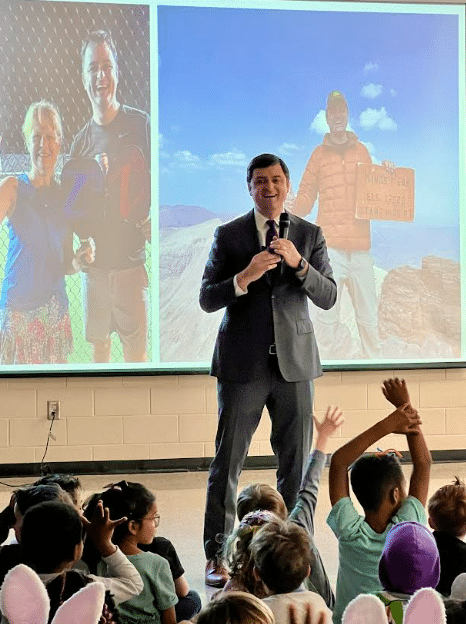
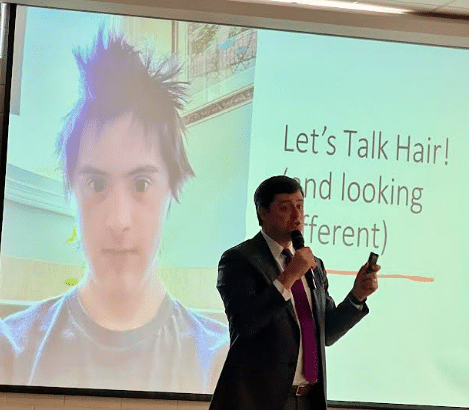
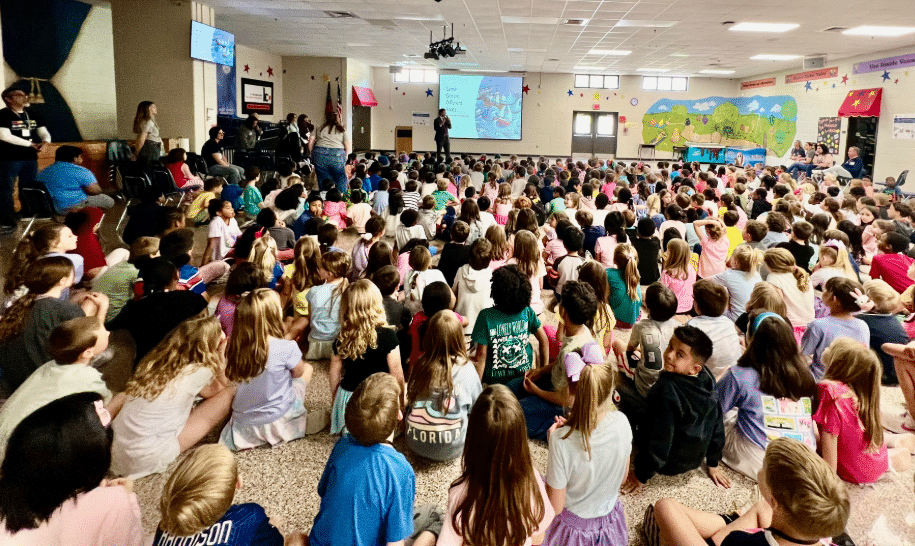
“Showing kindness and being inclusive is the best version of humanity,” said Dr. Taffeta Connery, Simpson Elementary School principal, in a statement about the event.
“Simpson Elementary has a special needs population of 214 (23%) of 946 students. [And] … we strive to ensure that our students are valued, recognized and instilled with high expectations for all.”
For more about Simpson Elementary, visit simpsones.gcpsk12.org.
Related
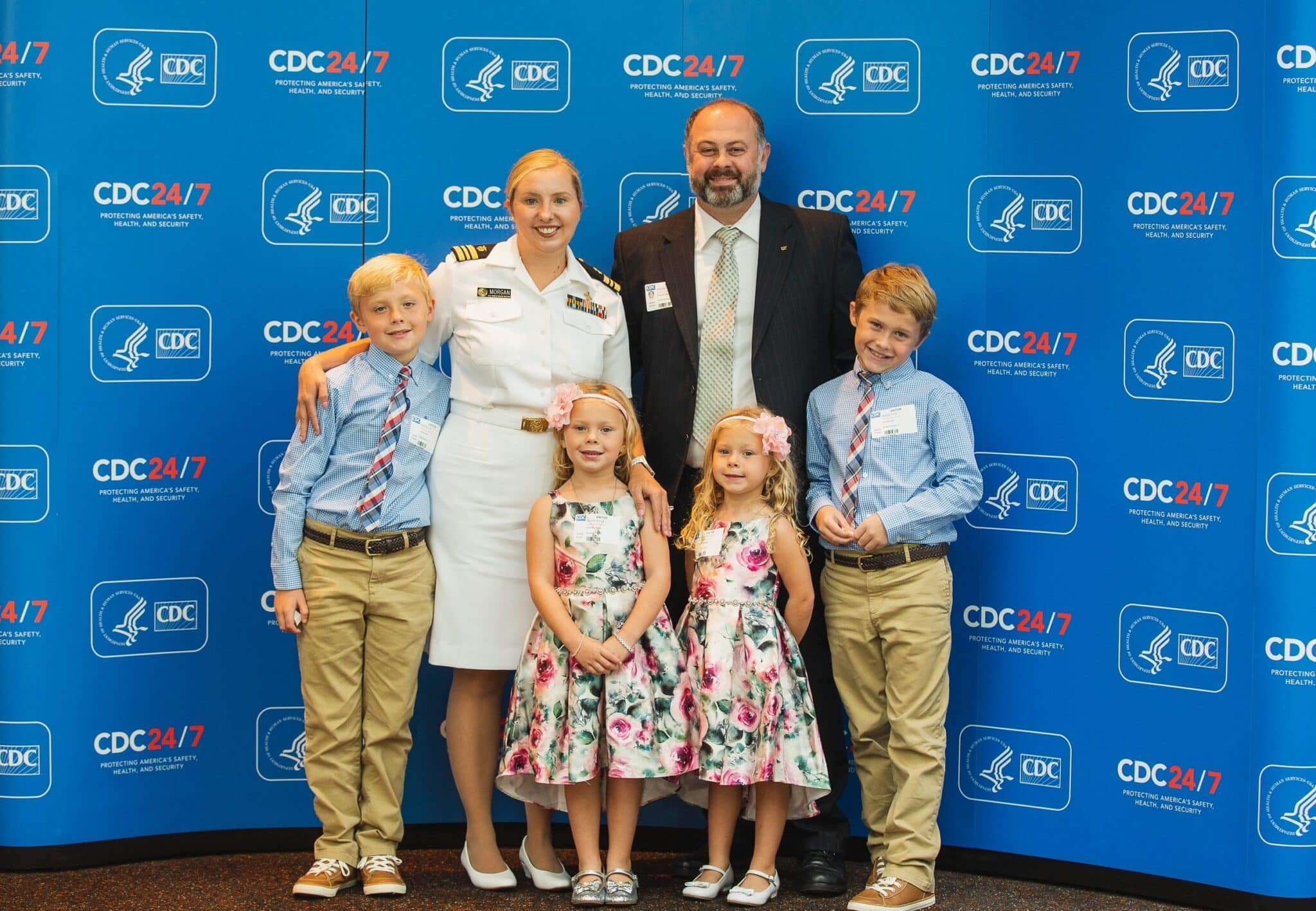
Motherhood comes with a lot of moving parts. For these Peachtree Corners moms, it also means leading teams, building careers and keeping the family schedule running. Most days, all at once.
This Mother’s Day, we’re spotlighting seven women in our community who are doing just that. They’re professionals in full-time leadership roles, showing up to strategy meetings by day and soccer games by night. They’re problem-solvers, planners, caregivers and coaches.
What connects them most isn’t just what they do, it’s how they do it. With intention. With humor. With support from partners, parents, friends and neighbors. And with a deep appreciation for the community they’ve built in Peachtree Corners.
Through their stories, we celebrate more than titles and to-do lists. We honor the quiet, constant work of showing up.
Tracy Lee
Tracy Lee leads with heart and vision as CEO of This Dot Labs, a software consultancy focused on helping businesses solve complex challenges through technology. Her engineering leaders collaborate with major clients like Stripe, DocuSign, Google, Wikipedia and Roblox. She’s passionate about her work.
“I love the mix of problem-solving and people leadership and knowing the work we do can make a real-world impact,” she said.
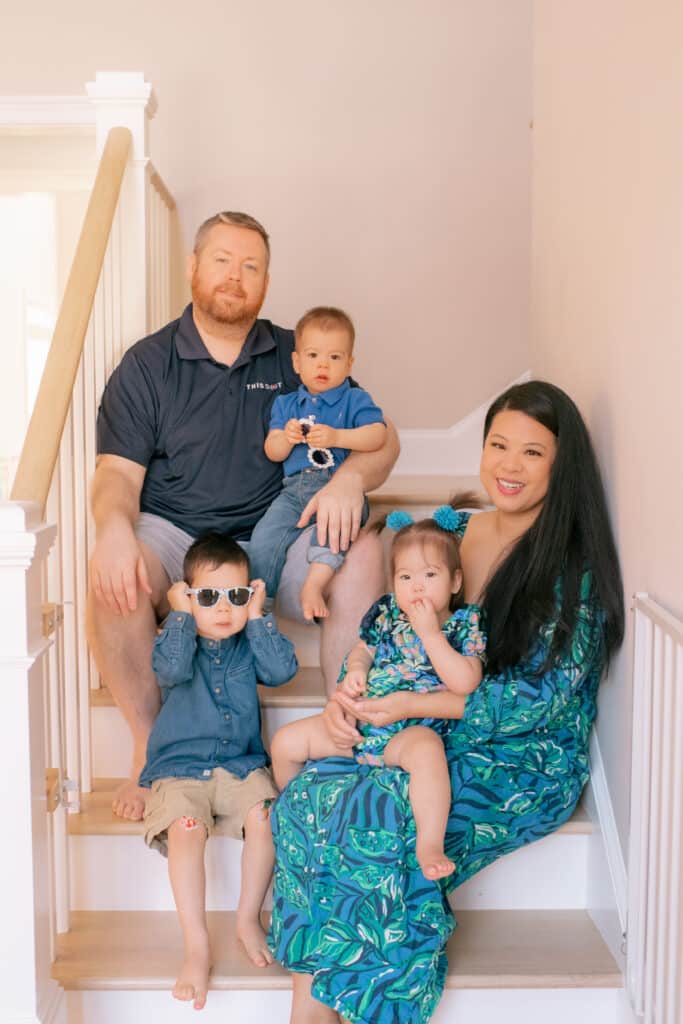
Tracy brings that same intentionality to her life at home, where she and her husband, Elliott Fouts, are raising three young children: William, 3, and twins Angelina and Marcus, who are 1.5. Despite the busy pace, Tracy is committed to being present in every role she plays.
“I have three full-time nannies and two part-time nannies, as well as girls around the neighborhood who are mama’s helpers to manage the chaos! With the help, we are able to do more and enjoy more time with our kids,” she said. “I try to be fully present, whether I’m in a meeting or building block towers in the living room. It’s never perfect, but we focus on what matters most in the moment.”
Tracy credits her support system for making it all possible. “I have an incredible partner and a strong support system between our nannies, friends and local community,” she said. “We have a local moms group for Asian moms called Georgia Asian Moms, and there are so many moms just in our neighborhood. It’s really great.”
Peachtree Corners has become a meaningful home base for the family. “We absolutely love it here,” she said. “There’s amazing programming for kids at The Forum every Tuesday in the spring and summer. It’s such a gem for young families.”
Weekends often include time outside and community adventures. “Sometimes the best hack is just piling everyone in the wagon and heading out for fresh air!” she said.
Tracy leans on a strong partner, a tight-knit group of friends and a local moms network. “It really takes a village,” she shared. “And I feel lucky to have one.”
Melissa Nicholson
Melissa Nicholson knows what it means to lead with heart and precision. As division vice president of program management & international solutions at Aya Healthcare, she helps internationally educated healthcare professionals enter the U.S. workforce.
“What I enjoy most is the opportunity to support these professionals in achieving their American dream,” she said. “While also contributing to improved patient outcomes across the country.”
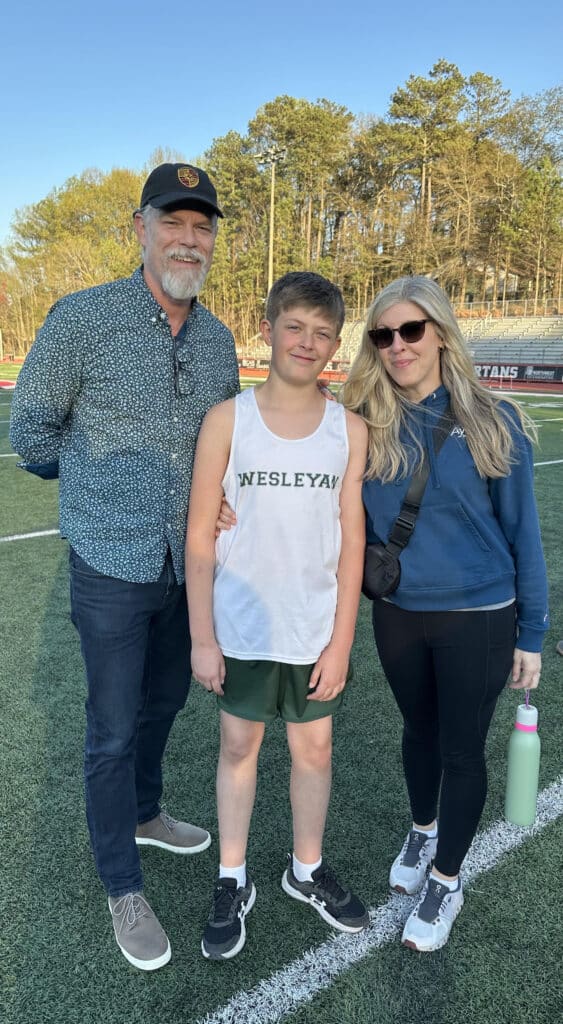
Melissa and her husband Greg recently celebrated 15 years of marriage. Their 12-year-old son, Luke, and a cat named Charlie bring a fun, loving dynamic of their own into the family. After relocating from East Atlanta a decade ago, they quickly embraced the Peachtree Corners community.
“It’s the people who make this community so special,” she said. “We’re truly grateful to count our neighbors as friends.”
Balancing an executive role with family life takes clarity and commitment. “I have to be very intentional with my time,” Melissa shared. She sets boundaries at work and makes sure her team knows when she’s off the clock for important family moments.
Wellness is a key part of her rhythm. “I recently started working out at Orangetheory Fitness,” she said. “I’ve noticed a significant boost in both energy and focus.” Sundays are for church and reflection.
When she travels for work, Greg holds it down at home. “We rely on each other to keep life running smoothly,” she said. “I’m grateful every day for that kind of partnership.”
On weekends, Melissa prioritizes quality time. Whether that’s a hike, pool day or baking something from scratch. “We’ve learned that if we don’t prioritize those moments, the weekends can quickly get taken over.”
Diva Hicks
For Diva Hicks, work isn’t just a job, it’s personal. As creative senior manager at CURE Childhood Cancer, her mission runs deep.
“At 12 years old, my sister was diagnosed with cancer,” she said. “CURE, in its early days, was a resource for my family.”
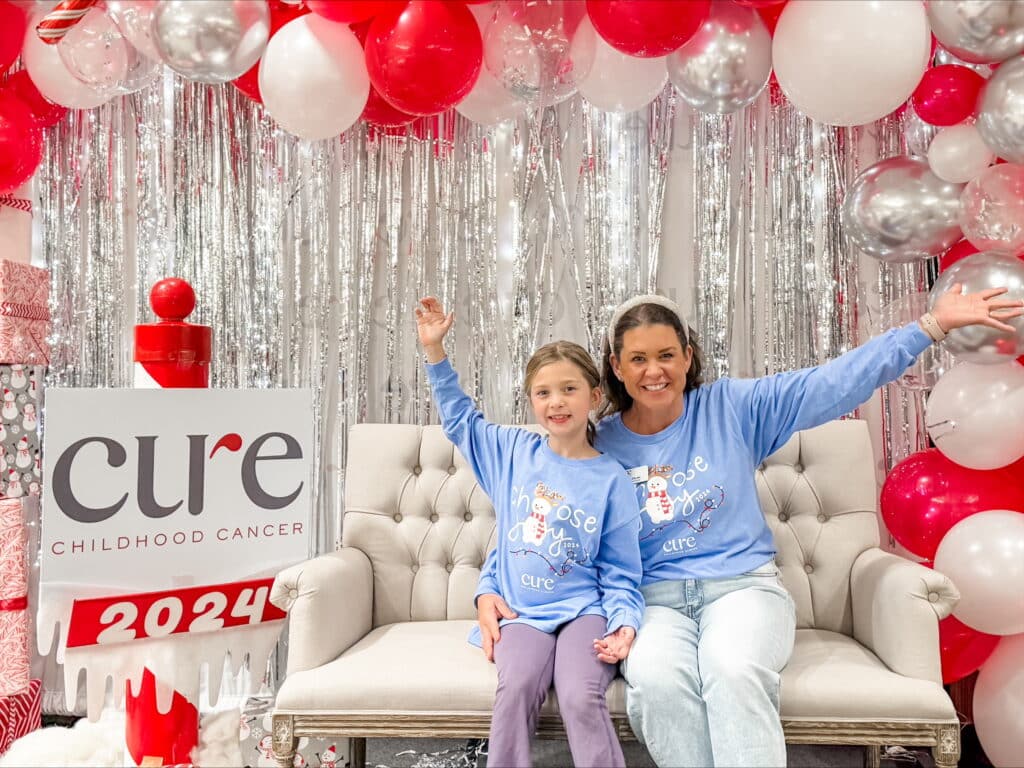
Her sister survived and now thrives. That experience shaped Diva’s career and continues to inspire her today. “This is my opportunity to give back to CURE for what it did for my family,” she said. “It’s rare to find a place where your purpose and passions collide.”
CURE also welcomes her whole family into the fold. “I get to bring my kids to events all the time,” she said. “They love feeling like they are a part of my work.”
Diva lives in Peachtree Corners with her husband John, their children Adair, 8, and Tripp, 6, and two golden doodles. “There is a sense of community here that I think is special,” she said.
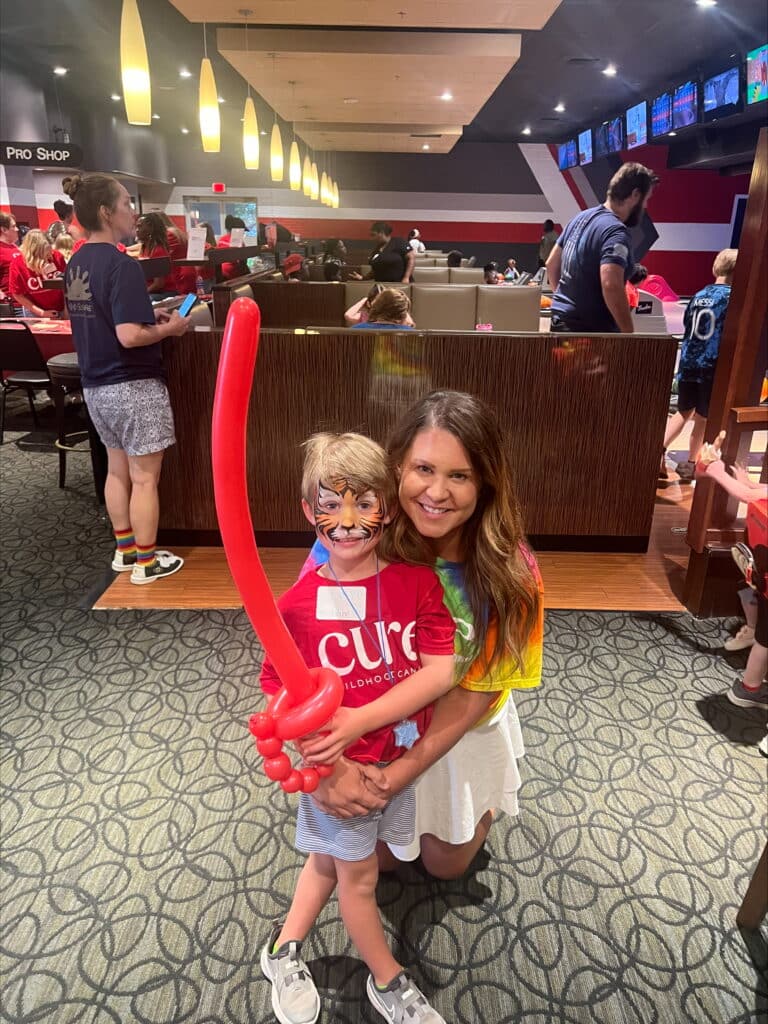
Balance is a daily effort. “John and I have tackled who helps with homework and on what days,” she said. “I would not be able to be the mom that I am without my village.”
She leads school committees and never misses events. “Is it easy? No,” she said. “But I honestly say, it’s not easy for any parent.”
Diva’s motivation is clear. “I want Adair to look at me and see that she can be a mom and have a career too.”
The family stays grounded with tennis weekends and careful planning. “We live by our calendar,” she said. “The more prepared I am, the easier life is.”
Kate Martin
Kate Martin knows how to bring structure to busy systems. As senior director of financial planning and analysis at Alloy Roofing, she finds energy in collaboration and clear strategy.
“In this role, I work closely with various teams across the business,” she said. “It supports the company’s strategy and performance.”
Kate and her husband, Nathan, are raising two children, 14-year-old Elliot and 10-year-old Evan, in Peachtree Corners. After ten years in the area, she credits the people for making it feel like home. “Life wouldn’t be the same without the relationships we’ve built here,” she said.
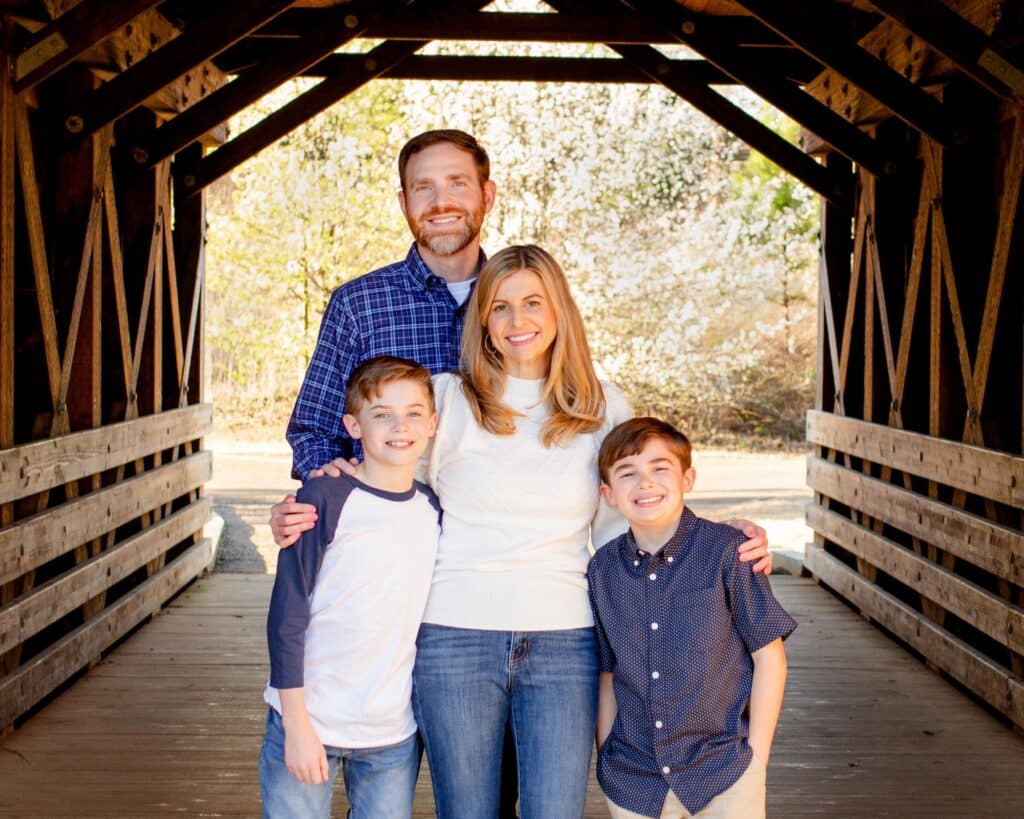
Balance starts with planning. “We keep a central Google calendar synced with all the family commitments that we review daily,” she said. “On Sundays we write on the kitchen boards.” Their chalkboard becomes the weekly roadmap, from meals to responsibilities.
“Seeing things laid out visually keeps me from overcommitting,” she added.
The family stays grounded by recognizing progress. “What keeps me motivated is celebrating both the big and small wins together,” she shared. “Sometimes, making it through the week is a victory in itself.”
Kate relies on a strong network. “We are very fortunate to have my parents nearby,” she said. “I also have an amazing network of women here in Peachtree Corners that I rely on.”
Her favorite hack? “An app Nathan created to help manage our calendars,” she said. “He created a solution to integrate these webcal subscriptions into a central subscription hub.” It’s called Skedj, and they’re piloting it now. “If you know this struggle and want to help us pilot the app, check out skedj.co!”
Linda Luna
As vice president at RSUI, Linda Luna manages risk while empowering people. She leads a team of underwriters who handle professional liability and cyber insurance. “I really enjoy my job because of its dynamic nature and the opportunity to help people in meaningful ways,” she said.
Whether she’s mentoring her team or protecting clients’ businesses, Linda finds value in impact. “It’s rewarding to know that my work has a positive impact on both my colleagues and our clients.”
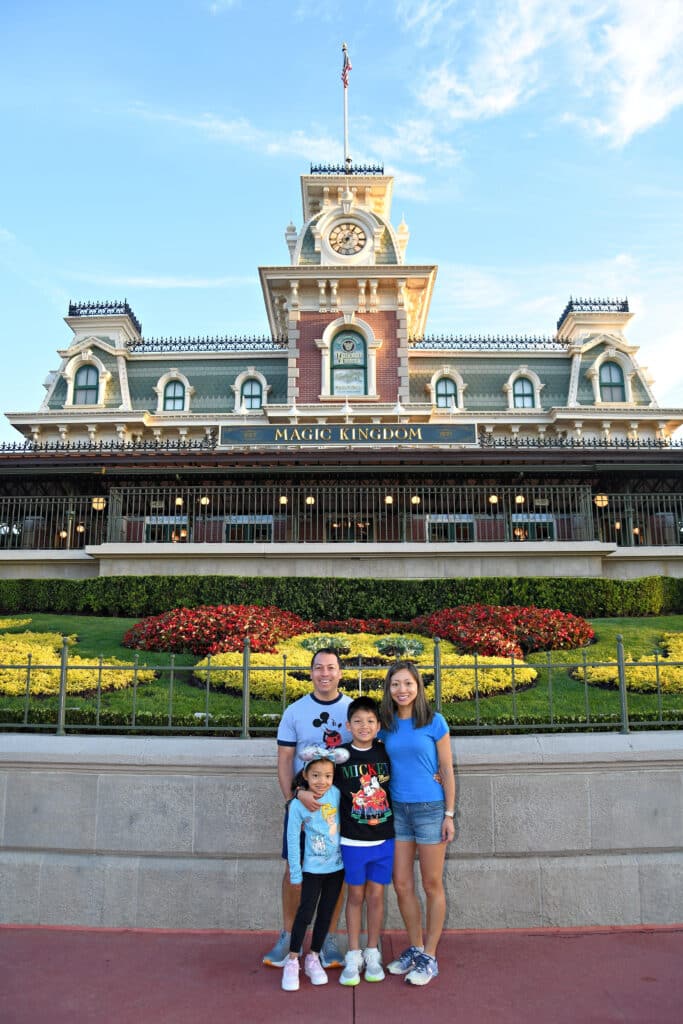
She and her husband, Ruben, are raising their two children, Dawson, 10, and Ava, 6, in Peachtree Corners. Her parents, though not under the same roof, are a constant part of daily life. “They help keep things running smoothly on the home front,” she said.
After nine years in the community, Linda has grown to love its blend of charm and convenience. “There is always something to do,” she said. “Whether it’s grabbing a bite at Ted’s or spending time with friends at Town Center.”
Balance comes from structure. “By establishing a solid schedule and sticking to it, I can ensure that my work commitments are met,” she said. “Being fully present allows me to strengthen my connection with my loved ones.”
When things get busy, she takes a practical approach. “Breaking it down into smaller, manageable tasks makes it much more approachable,” she said. “I remind myself to keep the bigger picture in mind and not sweat the small stuff.”
Linda’s support system is strong. “It truly takes a village, and I’m so grateful for mine,” she said. The family’s favorite tradition? A beach trip to 30A every May. “It’s our way of unwinding, reconnecting and making lasting memories together.”
Allison Blasetti
Allison Blasetti holds a national leadership role at Transamerica in the employee benefits division — a position that constantly challenges and motivates her. “What I enjoy most is the opportunity to use my talents to help my team,” she said. “I’m always growing and learning.”
She and her husband, John, are raising daughters Annie Mae, 8, and Olive, 6, in Peachtree Corners, where they’ve built strong ties in the community. “The amenities in our city provide many opportunities to run into friends around town or plan meet-ups,” she said.
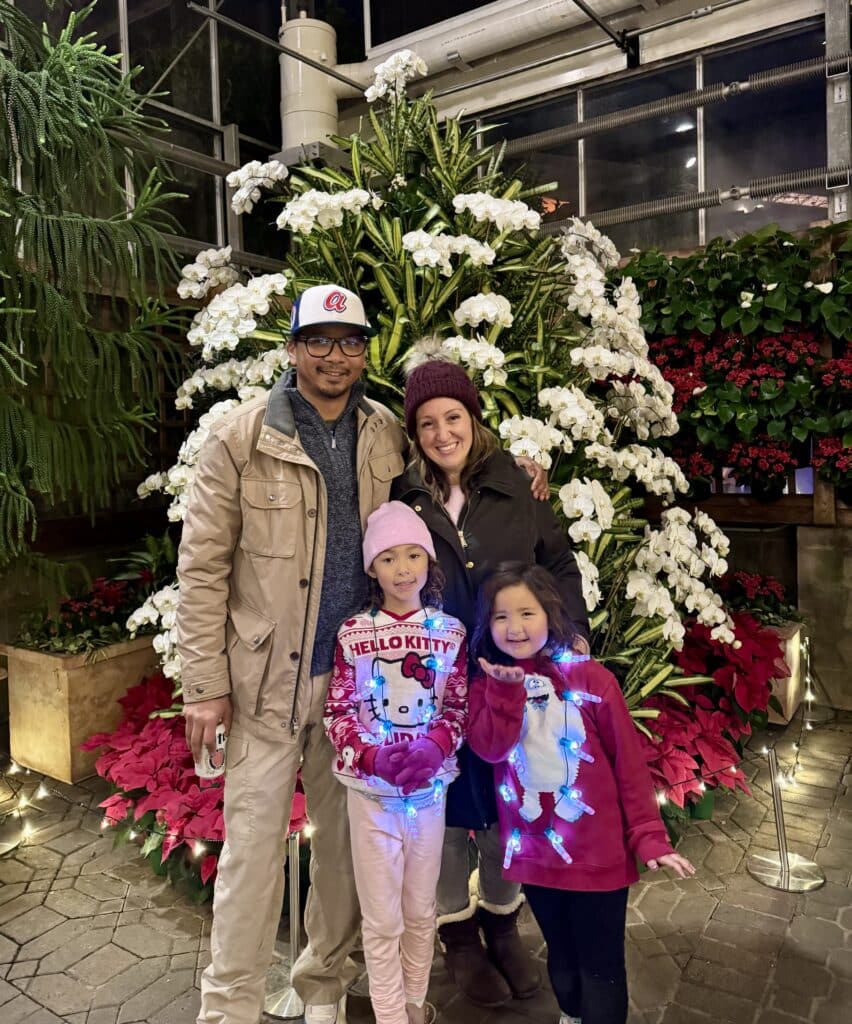
Allison works from home and prioritizes clear boundaries. “I turn off my app notifications because it quickly pulls me back in to work,” she said. “I also have a dedicated workspace in my house where I can leave at the end of the workday.”
She’s developed the habit of resetting her mindset, as well. “I quickly recognize [when] I’m mentally ‘at work’ and actively redirect my thoughts back to being in the present moment.”
Allison’s mornings begin at Burn Bootcamp, where she finds motivation and connection. “Spending an hour with my Burn community helps me get grounded for the day,” she said.
To stay organized, she and her husband use a shared family calendar. Her mom steps in often, especially when work travel ramps up. “I really don’t know what we would do without her.”
On weekends, Allison coaches Olive’s soccer team with the Peachtree Corners Football Club. “It brings me so much joy to be outside, see my soccer friends and watch my girls have fun,” she said. “Coaching makes it even better because I get to support the community that means a lot to me.”
Samantha Morgan
Samantha Morgan is a commander in the U.S. Public Health Service, currently assigned to the Centers for Disease Control and Prevention. Over her career, she’s responded to major public health threats, including Ebola, Zika and COVID-19. Today, her work centers on injury prevention, with a focus on issues like suicide, drowning and traumatic brain injury.
“What I enjoy most is being part of CDC’s mission to save lives and protect people,” she said. “I’m proud to contribute to work that makes a tangible difference in communities across the country.”
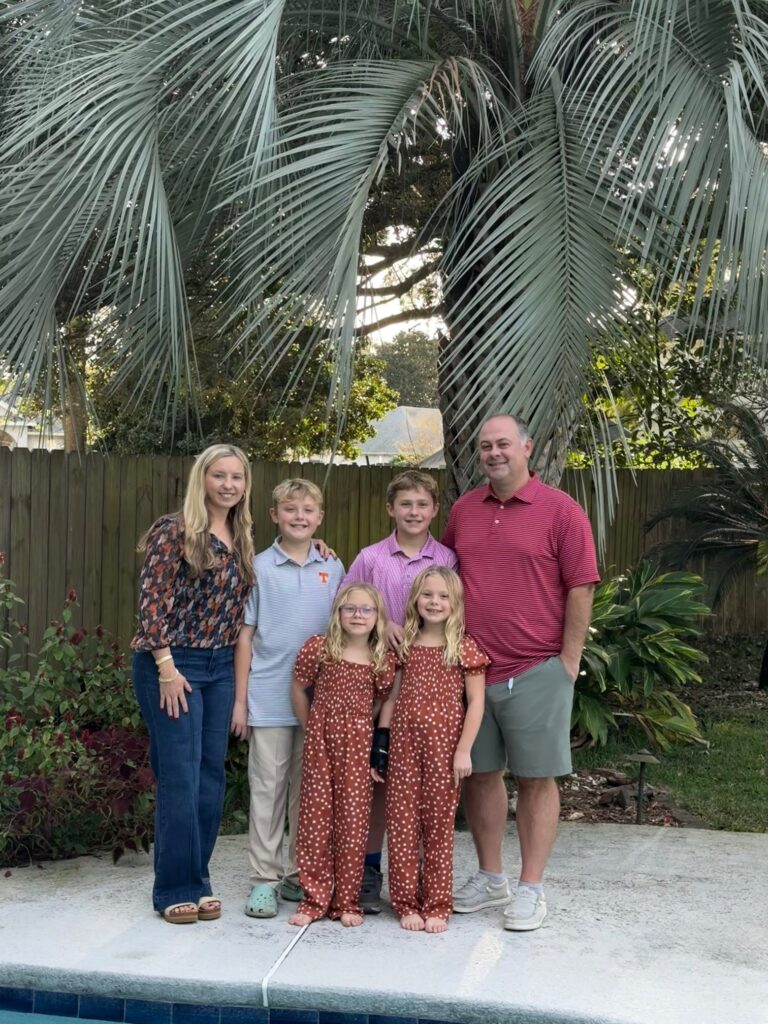
At home in Peachtree Corners, Samantha and her husband, Brian, are raising two sets of twins. Luke and Elliot are 12-years-old and love baseball, golf, basketball and band. Charlotte and Noelle are 8-years-old and enjoy piano, tumbling and tennis. “Life with four kids is wonderfully busy,” she said. “I often joke that I’m an unpaid Uber driver!”
After more than a decade in the neighborhood, Samantha credits their support system for helping them manage the day-to-day. “Our neighbors and friends — our village — have supported us through the hardest moments and celebrated life’s greatest joys with us,” she said.
Structure is key to keeping things on track. “We live and breathe by our family calendar,” she said. “Shared schedules, group texts and carpooling help us keep things running.”
Her children remain Samantha’s biggest motivators. “They know, ‘mom’s going to work to help make the world a safer place,’” she said.
The family also leans on routines and simple joys. “Checklists are my go-to mom hack,” she shared. One of their favorite traditions is make-your-own-pizza night. “It’s messy, silly and something we all genuinely look forward to.”
The seven women featured here offer a glimpse into the lives of working moms in Peachtree Corners. Each one balances career, family and community with care and intention. They are just a few of the many women — both working and stay-at-home — who nurture, organize and uplift the people around them every day.
Whether leading teams or guiding their children, mothers across this community show up with strength, love and quiet determination.
You’ll find this story in the May/June issue of Peachtree Corners Magazine, available in print and digital edition.
Related
City of Peachtree Corners
Official City Merchandise Line Debuts This Saturday at Town Green
Published
3 days agoon
May 6, 2025
This Saturday, May 10, residents and visitors are invited to experience the debut of Peachtree Corners’ official merchandise collection at the Town Green. The pop-up shop will be open all day, beginning at 8 a.m., located directly behind the former Jinbei restaurant.
This pop-up shop is provided through a pilot program with Vox-pop-uli and the City of Peachtree Corners.

“We’re thrilled to showcase our city’s spirit through this exciting new merchandise line,” said Louis Svehla, City of Peachtree Corners director of communications. “There’s something for everyone, whether you’re a proud local or just visiting. We are excited about testing this pilot program to raise funds for continued improvements at Town Green and events.”
Featured items include:
- brand new concert-themed apparel
- city-branded merchandise
- limited edition collectibles
- perfect Mother’s Day gift selections
With Mother’s Day approaching, shoppers will find unique, locally inspired gifts guaranteed to delight mom with something she doesn’t already own.

Visitors can browse and purchase items throughout the day, with friendly staff available to assist with selections.
Event details
Date: Saturday, May 10
Time: Starting at 8 a.m.
Location: Town Green (behind former Jinbei location)
Payment methods accepted: Cash and credit card accepted
Related
Read the Digital Edition
Subscribe
Keep Up With Peachtree Corners News
Join our mailing list to receive the latest news and updates from our team.
You have Successfully Subscribed!

Katherine Lafourcade — A Journey of Passion, Resilience and Giving Back

GA Tech Launches First-of-its-Kind GT Atrium in Peachtree Corners

Digital Edition

PCBA Announces 2025 Scholarship Winner

Paul Duke STEM High School Student Earns CGO Scholarship

World Blood Donor Day Starts Here: Theo’s Miracle, Katherine’s Mission [Podcast]

Official City Merchandise Line Debuts This Saturday at Town Green

Peachtree Corners Grows Business Opportunities Through Economic Development

City of Peachtree Corners Awarded Certificate of Achievement From GFOA for Seventh Straight Year

Simpson Elementary Marks Exceptional Children’s Week

Executive Function: A Tribute to Working Moms

Official City Merchandise Line Debuts This Saturday at Town Green

Peachtree Corners Grows Business Opportunities Through Economic Development

Digital Edition

World Blood Donor Day Starts Here: Theo’s Miracle, Katherine’s Mission [Podcast]

Paul Duke STEM High School Student Earns CGO Scholarship

Light up the Corners [Video]

Capitalist Sage: Business Leadership in Your Community [Podcast]

Cliff Bramble: A Culinary Adventure through Italy

Top 10 Brunch Places in Gwinnett County

A Hunger for Hospitality

THE CORNERS EPISODE 3 – BLAXICAN PART 1

Top 10 Indoor Things To Do This Winter

The ED Hour: What it takes to Remove Barriers from Education

Peachtree Corners Life
Topics and Categories
Trending
-
Digital Edition5 days ago
Digital Edition
-
Podcast5 days ago
World Blood Donor Day Starts Here: Theo’s Miracle, Katherine’s Mission [Podcast]
-
City of Peachtree Corners3 days ago
Official City Merchandise Line Debuts This Saturday at Town Green
-
Business3 days ago
Peachtree Corners Grows Business Opportunities Through Economic Development







